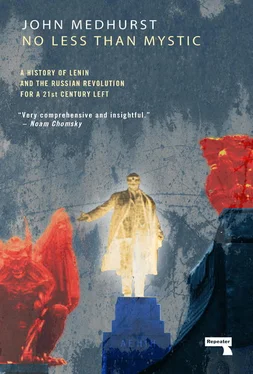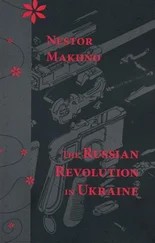A far better defence of Leninism can be found in Deutscher’s classic three-volume life of Trotsky. 15Written with flair and passion and rooted in a serious Marxist analysis utterly devoid of Lukács’ theoretical verbiage, Deutscher’s intention was to provide a redemptive account of Trotsky’s role in the revolution and, especially, as Stalin’s great antagonist, the holder and heir of the “Classical Marxist” tradition. He wished to show Trotsky as a man of consistent principle, vital to the success of October and the Bolsheviks’ victory in the civil war, a historical and literary critic of the first rank and the man who maintained the heroic ideal of October while nearly all other Bolsheviks either capitulated to or were eliminated by Stalin. Deutscher achieved all this. His trilogy is intellectually stimulating and politically engaging and yet it is, ultimately, an apologia for Leninism and therefore, tragically and unintentionally, for Stalinism.
At the close of Deutscher’s first volume, taking Trotsky’s life to 1921, he acknowledges the immense problems that economic collapse and the civil war had created but concludes that “the Working Class had not come to regret the revolution”. Although true in a general sense–the working class did not wish for a restoration of Tsarism–this frames the argument to equate “revolution” with one-party rule by the Bolsheviks. It thereby misrepresents working-class resistance to that rule and is untrue to the period. To take one example, Deutscher casually observed that “In three years the Socialist Revolutionaries and Mensheviks had been completely eclipsed and hardly dared raise their heads”, omitting to mention that the primary reason they hardly dared raise their heads was relentless legal and physical persecution. 16He also ignored the inconvenient fact that in 1918 and 1919 the Mensheviks made a notable comeback in the few Soviet elections not rigged by the Bolsheviks.
The belief that the Bolsheviks had by definition conducted a socialist revolution, and therefore all their actions were justifiable expedients to defend it, undermines Deutscher’s entire analysis. Whilst intensively examining the pressures of economic crisis and civil war he hardly mentions the suppression of Soviet democracy from an early stage after October, the rise and suppression of the Extraordinary Assembly of Delegates from Petrograd Factories and Plants (EADS), and the liquidation of the Kronstadt rebellion, to which he devotes three pages which completely avoid the issues raised by the rising. After a quick reference to the rising being “led by anarchists” (it was in fact led by veterans of 1917 who wished to return to democratic Soviet power), Deutscher’s hurried account of the rebellion is a brief and unsatisfactory summary of events, lacking any of the deep analysis he brings to other subjects. He does not even mention the mass strikes convulsing Petrograd and Moscow at the time, which ignited the Kronstadt revolt, nor the imposition of martial law to crush them.
The less ideologically committed work of E.H. Carr (whose fourteen-volume History of Soviet Russia from 1917 to 1929 was a groundbreaking study, soaked in Namierite “objectivity” that evoked much admiration within British historiography) provided a similar whitewash, such was his admiration for the scale of the economic transformation attempted and achieved by Soviet planners. This admiration led him to conclude that not only was Lenin a figure of “unique greatness”–quite true, in the sense of his effect on world history–but that “his genius was far more constructive than destructive”. 17Given Lenin’s record, this is an astonishing conclusion and demonstrates that for all its impressive academic rigor Carr’s work lacks moral or cultural sensitivity. It is undeniable that Lenin constructed a massive and historically unprecedented edifice upon the ruins of revolution and civil war, but he greatly contributed to those ruins in the first place and the edifice was so defective that it rotted from within.
Deutscher’s skillful justification of Leninism, added to and indirectly supported by Carr’s monumental research, was highly praised and influential. Lesser writers, such as the Italian Marxist Lucio Colleti, followed in its wake. A leading figure of the post-war Italian Communist Party and a key thinker of the 1960s New Left, Colleti’s From Rousseau to Lenin (winner of the Isaac Deutscher Memorial Prize in 1972) considered the meaning and relevance of Lenin’s The State and Revolution in comparison to the work of the more “evolutionary” Marxist Karl Kautsky, and concluded that “for Lenin, the revolution is the end of all masters; for Kautsky, it is merely the arrival of a new master”. 18Yet nothing in either man’s work justifies this. All Lenin’s actions post-October, and his own unequivocal statements about the paramount need for authority, control, direction from the top and one-person management, demonstrate that the revolution he actually led (as opposed to the one he wrote about in The State and Revolution) was about the arrival of a new master.
A similar level of self-delusion is found in the work of Belgian Marxist economist and theorist Ernest Mandel, which had some vogue within the left of the 1960s and 1970s. Mandel considered that the Leninist theory of organisation created the “Marxist science of the subjective factor”, i.e. it provided a theoretical justification and guide to practical actions–although one could say the same of Bernstein’s Revisionism, implying that it was the subjectivity rather than the science that concerned Mandel. For Mandel, what he called “comprehensive political activity” would “answer all questions of internal and external class relations” and thereby would “train the masses”, who were otherwise “limited to the confines of the trade union or the factory”. 19This was written in 1970, apparently unaware that many working-class men and women already had lives and dreams beyond the confines of the trade union and the factory. Many, indeed, had never set foot in a factory.
Marcel Liebman’s highly successful Leninism under Lenin (1975) offers a more substantial argument. Liebman, whilst defending and justifying Lenin’s basic record before and after the Bolshevik Revolution, acknowledged that he never solved (or even tried to solve) the problem of how to organise a meaningful democracy within the “socialist dictatorship” that he and Trotsky openly admitted was their aim, and that “the limitations of his thinking about western capitalist society” 20were so serious that he utterly misread the role of reformism within those societies. Precisely because of Liebman’s honesty in examining these weaknesses, his carefully argued conclusion that in the final analysis Leninism “gave back to the working class movement a revolutionary content that corresponds to the alienated situation of the proletariat in capitalist society” 21was superficially persuasive.
Enthusiasm for Lenin–based partly on reading Deutscher, Liebman and Cliff, but also (and perhaps mainly) on unquestioning acceptance by middle-class students of a simplistic radical image of unyielding revolutionary integrity, aided by numerous posters, T-shirts and badges–grew out of the political turmoil of the 1960s and 1970s, and abated somewhat in later decades. But recently it has come back into intellectual fashion, as demonstrated by the works of Lars Lih, Slavoj Žižek, Paul Le Blanc and Tamas Krausz. Lih’s work, in particular his massive exegesis Lenin Rediscovered: What Is To Be Done? in Context (2006) and his shorter primer Lenin (2011), has laid the groundwork for a redefinition of Lenin for the Occupy generation. Lih considers Lenin more of a romantic revolutionary activist than a puritanical Marxist intellectual. In an important sense this is right, although not in the manner Lih intends.
Читать дальше












